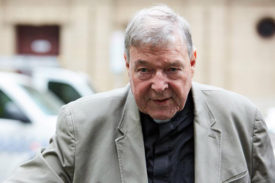
The Tablet Staff
Australian Cardinal George Pell, who was convicted of sexually abusing two choir boys more than 20 years ago, began his court appeal of the conviction on Wednesday June 5.
The judges in the Victoria state Court of Appeal are hearing Pell’s appeal over the course of the next two days, reported the Associated Press on Tuesday.
In December of 2018, Pell was convicted on five counts of sexual abuse of minors related an incident that occurred in the 1990s, according to Catholic News Agency.
In 1996 Pell had newly been installed as the Archbishop of Melbourne.
In March of 2019 Pell was sentenced to six years in prison, where he is currently being held in special protective custody.
Now, Pell may have a strong chance of winning the appeal on the ground that the verdicts were “unreasonable,” said Professor Jeremy Gans from Melbourne Law School, an expert on Victoria criminal law.
This week Pell’s legal team is appealing on three separate grounds, according to Catholic News Agency, including that the guilty verdict was returned, despite the lack of proof beyond reasonable doubt.
In written submissions, Pell’s lawyers argued that 20 witnesses present at a Sunday Mass in 1996 on the day Pell allegedly molested the choirboys, each gave evidence that the events did not or could not have occurred over the course of the five to six minutes when prosecutors alleged the incident took place.
“This evidence constituted a catalogue of at least 13 solid obstacles in the path of a conviction,” the submissions read.
Bret Walker, a member of Pell’s legal team, said the evidence used to convict Pell was clearly insufficient to find his client guilty beyond reasonable doubt.
Pell’s legal team has prepared a video graphic for their closing statement, which they say will demonstrate that the alleged crimes committed on that Sunday would have been impossible, reported the Associated Press.
It the court determines that the verdict is found unjust based upon the provided evidence, Pell would be acquitted, set free and would not have to be retried.
During his trial, Pell was not asked if he pleaded guilty or not guilty in front of the chosen jury. This was considered by his legal team to be a “fundamental irregularity” in the trial, and is another ground for an appeal.
Even if the appeal is successful at any level, Gans said the case could still end up in Australia’s final appeals court.
“I’m sure whoever loses in the Court of Appeal is going to try to appeal in the High Court. Once it gets to the High Court, things get really unpredictable. They’re the least predictable court in Australia.”
Pell’s case is one of multiple reports of abuse by clergy within the Catholic Church. In the past year Chile has faced its own issues of abuse, a French cardinal was convicted of failing to report an incident and a Vatican investigation led to the laicization of U.S. Cardinal Theodore McCarrick.
